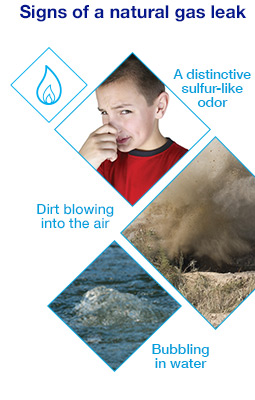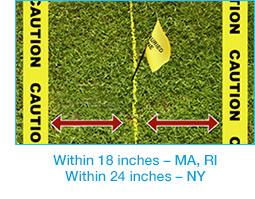| |
Important Information:
School Safety & Emergency Preparedness
(Please share this pipeline safety information with your staff, facilities managers and contractors.)
Dear Superintendent, Principal, Custodial Personnel or Building/Grounds Director,
We are committed to your safety. National Grid’s underground pipelines deliver natural gas efficiently and reliably to schools, homes and businesses across New York, Massachusetts and Rhode Island. To ensure the safe operation of these pipelines we:
- monitor our gas operations around the clock;
- inspect pipelines regularly for leaks, defects and corrosion;
- educate the public about safe digging practices;
- conduct training and periodic drills with emergency responders to prevent and prepare for natural gas emergencies.
Make natural gas leak recognition and response part
of your school’s plan.
Gas pipeline incidents can happen, so you and your staff need to know how to identify a gas leak and what to do in response. Review your school safety and evacuation plans and be sure they include these procedures for recognizing and responding to a natural gas emergency:
 -
Recognizing a gas leak. A distinctive, sulfur-like odor is added to natural gas to help with leak detection. But not all gas is odorized, so do not rely on your nose alone to detect a leak. Be alert for a hissing, roaring or whistling sound from the ground or from gas equipment; dirt spraying or blowing into the air from a hole in the ground; and continuous bubbling in water.
-
Responding to a gas leak. If you suspect a gas leak, assume there’s a danger. Evacuate everyone and move to a safe location far from the site of the possible leak and upwind if possible. DO NOT use matches, lighters, radios or anything electrical – even a cell phone. From a safe location, call 911 and National Grid at the emergency number in your area listed below. Keep everyone far from the leak until emergency response personnel lets you know that the area is safe.
Learn the location of natural gas pipelines in your area.
High-visibility markers with National Grid’s 24-hour emergency phone number indicate the general location of our high-pressure natural gas pipelines. These markers are meant only as a general guide and warning and do not mark a pipeline’s precise location or depth. You can also locate pipelines in your area by visiting the National Pipeline Mapping System website at https://pvnpms.phmsa.dot.gov/PublicViewer.
Help protect natural gas pipelines.
The greatest risk to gas pipelines is accidental damage from digging activities. Even a tiny gouge, scrape, dent or crease to a gas pipe or its coating could lead to a catastrophic fire or explosion. Please share these pipeline damage prevention guidelines with your staff, facilities managers and contractors:
 -
Call 811 before you dig. Call 811 at least 72 hours before digging in Massachusetts and Rhode Island (excluding weekends and legal holidays) and at least two full working days before digging in New York (excluding the day you call, weekends and legal holidays). This free service will arrange for marking of buried natural gas pipelines in your dig area so nearby excavation can be done safely.
-
Respect the marks and dig with care. Gas pipelines are marked with yellow flags, stakes or paint marks. Leave these in place until digging is completed. Use only hand tools – no mechanical equipment – within the “tolerance zone,” which is within 18 inches of either side of the marked location of buried utilities in Massachusetts and Rhode Island, and within the width of a marked utility plus 24 inches from each indicated outside edge in New York. Report any pipeline contact – of any kind – immediately to National Grid at the natural gas emergency phone numbers listed below.
 |
|
Smell Gas. Act Fast. |
| |
| |
In a natural gas emergency, call National Grid:
24 hours a day, 7 days a week
|
|
| |
New York
Long Island and
the Rockaways:
1-800-490-0045 and 911
Metro NY:
911 and 1-718-643-4050
Upstate NY:
1-800-892-2345 and 911
|
|
Massachusetts
1-800-233-5325 and 911
Rhode Island
1-800-640-1595 and 911
|
|
|
|
|
|


